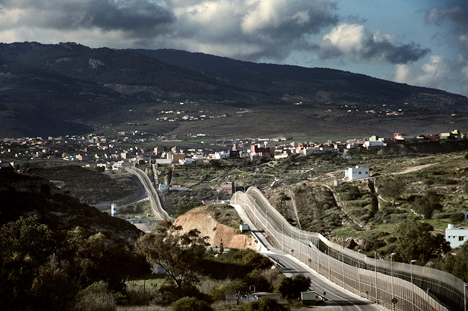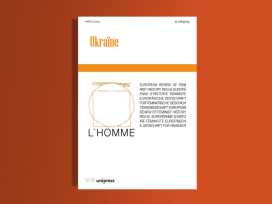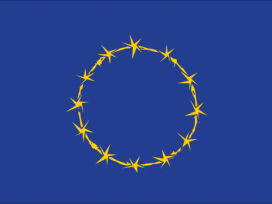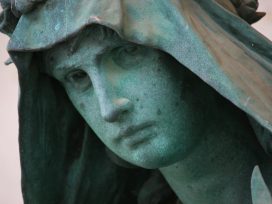“Sure, they can make tougher laws. But I will still leave.” So says Mohamed from Tunisia, who, after working illegally on Italian construction sites without building permits for many years, now finds himself in the Tunisian harbour town Kélibia, only 80 kilometers from Europe. His voice has been important for us while working on issues of Glänta devoted to the topic of migration this past year – one voice among many from Fabrizio Gatti’s reportage, in which Gatti travels as “Bilal” from Senegal, through Mali, Niger, Libya and Tunisia to Europe, along the road that many African refugees travel each year. We met with Fabrizio Gatti during the book fair in Gothenburg in September 2014, and one week later at the Eurozine conference in Conversano, Italy. With his continuous work on refugee issues and his book Bilal: On the Slave Route to Europe as a starting point, we wanted to discuss the gaps and interconnections between national and European levels, and between formal systems and the informal, as regards the field of migration.

Six-meter-high, 12-km-long wall surrounding Melilla, Spain. From the exhibition “Moving Walls” in connection with the 2014 festival “Lector in fabula” in Conversano, Italy. Photo: Giovanni Cocco. Source: Lector in fabula.
Göran Dahlberg & Linn Hansén: We would like to start with the question of borders. Around the 25th anniversary of the fall of the Berlin wall, one is conscious that although many walls have been torn down since the Iron Curtain, many remain, external as well as internal, and many have been reinforced. It’s not easy to know whether there are more or less fortified borders in the world now than there were 25 years ago, but the violence surrounding them is no doubt escalating. Everyone is officially working against migrant smuggling, that is, by building higher walls, more efficient control systems etc., and thereby – in one sense – actually creating better conditions, better business opportunities, for smugglers. What do you think about the idea of no borders – as a discursive strategy or as an idea, but also as an actual future state of the world? Is it, for you, at all relevant to address as a political question: the possibility of a world with no borders between countries, with free migration?
Fabrizio Gatti: Illegal conditions are created by border laws. But the problem is not the existence of borders; actual geographic borders do exist, the sea could be a border, mountains could be a border. It’s the possibility of crossing the borders that is important. I believe that if we approach the discussion about migration by talking about the very existence of borders, we push the prospect of reaching any form of agreement very far away.
Europe has not left its nationalisms behind. When someone says that in Sweden we welcome refugees and we have a good system for doing so, or when Austrians say that we have to close the border to Italy because too many people are coming, both of these statements originate from nationalism. Nobody in government and few among the people consider themselves European citizens. The internal borders still exist. In a situation like this, we place ourselves very far away from what has to be done today by posing the question as to whether borders, around Europe or anywhere in the world, are to be recognized at all.
Ideally, I think that there shouldn’t be any borders in the world, human beings should be free to move wherever they like. But if I start to discuss the abolition of borders now, when so many people are dying along the European borders, it will only delay the resolutions and political decisions urgently needed to change this situation.
If we ask for example a Syrian survivor of one of the many shipwrecks in the Mediterranean what he or she thinks about the abolition of borders, he or she will probably say something like: “Well, I agree that the borders are the reason for my condition, but I don’t think people are dying because of the existence of borders.” Because borders are many things: borders still live as a myth inside the minds of people; borders are geographic differences, you have the Alps and on one side you speak Italian and on the other you speak German or French; and borders are in some cases physical constructions.
I think that we should talk instead about the fact that people die because they are denied a small piece of paper, even though this paper is the result of the construction of borders. How much does this piece of paper cost? The ink on it, how many cents for a passport? People die for these papers.
What is going on both sides of the Mediterranean Sea can no longer be called migration, or immigration. It is an escape, people are jumping on the boats because they know what they’re leaving behind.
When I set off on my journey as Bilal in 2003, I’d say that around 75 to 80 per cent of my fellow travellers were what you would call economic migrants. They were coming from very poor conditions, but not from war or the kind of regimes that we’d consider a dictatorship. Around 20 to 25 per cent were asylum seekers, mainly from the same countries as previously: Eritrea and Somalia. The main reason for this is that, in Eritrea, military service lasts 40 years, it’s a life sentence. At the time, there were also Liberians, and people from Sierra Leone because of the civil war there. Ten years later, the situation has changed. Now, between 80 and 90 per cent are asylum seekers, and not only from Eritrea and Somalia.
People go to Libya or Egypt and risk their lives and die, because they know that in our countries we cannot refuse to give them assistance, since we signed the international convention. When refugees from the war in Syria heard the Swedish government say that they would give permanent permits to all Syrians, they went to the consulate in Istanbul and said “I heard the news on the radio and I would like to ask for a permit to stay in Sweden”. The response they were given was “No, you have to be there, in Sweden, to apply for a permit”. “How can I be there, when I’m here?” “Ah, that’s your problem.” But you cannot talk about the end of the journey, without considering the journey itself. Before we talk about a world without borders I would like to discuss the problem of papers, trying to find solutions to bypass the borders – by providing visas, opening humanitarian corridors, investing in refugee camps in Egypt, Jordan, Lebanon, helping the governments there to assist the huge amount of refugees on the move. In 2014, by the beginning of September, 125,000 people had arrived in Europe using traffickers, which is the only international agency that saves peoples lives – by putting them on sinking boats.
These 125,000 people, it might be 130,000 by now, could be seen as the equivalent of a European city. “A big city! How could we receive all these people?” That is the rightwing answer. But the population of the European Union, which in migration terms is to be considered as a nation since we have common borders, is almost 507 500 000 people. Which means that in each European city the size of Gothenburg, with around 500,000 people, we have 125 refugees per year. It would be very strange if a quite rich European city of 500,000 people couldn’t give assistance – temporary or permanent – to 125 persons a year. But if we consider the issue in national terms – “We do too much and they don’t do enough” – we won’t find any solutions and people will continue to die at sea. Moreover, this kind of argument strengthens the influence of those claiming that we have to strengthen the borders.
In one sense, this has to do with our responsibility as progressive journalists and writers. We tend to look too much at overarching, “idealistic” problems, ignoring more pragmatic approaches. The EU was supposed to do away with borders. And we did away with borders for money and for goods, but not for people. Inside Europe, the borders are still strong, which is why I hesitate to talk about doing away with borders. Because I know they exist inside most people. Therefore I prefer to talk about papers.
GD & LH: Do we, as journalists, publishers and activists, have to make a choice between different kinds of critiques, in relation to the system? What would you say is the most relevant target of critique today: the European migration system and the way it is meant to function (the laws, regulations etc.), or the fact that this system is not functioning the way it is meant to? The problem (if one could say there is one single problem) seems to be double-sided: formal systems are both not functioning according to their premises, and the premises themselves might not even be worth fighting for. Even if the system worked the way it is supposed to, it would not in any substantial way change the terrible situation for today’s migrants.
One example could be the Lampedusa shipwreck of 11 October 2013. You have written about it in the article Passing the buck (Eurozine, 15 September 2014): “And the final, unacceptably bitter irony: the ship named Libra belonging to the Italian Navy was very close to those refugees – just beyond the horizon, 27 miles away. That’s less than an hour. But for a long time, too long, neither Italian nor Maltese authorities requested its intervention.” And you conclude with what you call “a simple and perhaps stupid question: Why? Why is the process of ‘passing the buck’ so powerful, even when it comes to saving lives? Why, when there is supposed to be a ‘European’ issue, is there still this ‘game’ played between nation-states?”
What do you think about choosing between different kinds of strategies? Do you believe that the master’s tools will never dismantle the master’s house? Or is it rather the other way around, that it is exactly those tools that are needed in this situation, that the critique has to be immanent in order to actually make a difference? Is this a choice you find relevant, as someone trying to investigate these matters? And what is your opinion on the question of working from within or from the outside – if there is such a thing as an outside position?
FG: In Europe, we have some models that are considered good for assisting asylum seekers. For example, people who are inside the German system can get housing quickly, they can attend language courses or training courses, which means they learn quite quickly to speak the language and can work as trainees until they’re independent. Most of them remain in Germany. I consider that a good system, once you are inside.
The Swedish one, as I understand it, could be considered good compared to the Greek or Italian system. Other models are not functioning very well. For example, in Italy you are supported by the state as long as you are an applicant, but once you get the permit you are left on the street. Only a very small number of people find accommodation or decent work, which is why many refugees burn their fingerprints with acid, trying to get to Sweden or Norway. After years of living in old factories or abandoned houses in Rome or Milan, working as slaves, they find no other solution. I consider that a bad system.
At the same time, the Italian government decided in October 2013 to carry out the Mare Nostrum operation, and use navy military ships to rescue people at sea. Which in itself was a good operation. Other countries, like Greece, are pushing back people and killing people at sea, France is doing nothing… Spain is allowing the Moroccan military into Melilla to club migrants who jump the fences. Fourteen people were killed last spring when the Spanish police shot at them swimming away.
I am disappointed that European politicians haven’t done anything since the shipwrecks – they should already have done something before. But still, I believe in a common solution. The first step should be to sit down and identify what is best about the various national models. If the EU used the money with which they now purchase motorboats for Frontex operations to fund government efforts to help refugees, I think governments would actually help more refugees. But the question then would be: are European citizens, after decades of xenophobic campaigning from all sides, even by parties on the Left, ready to face this discussion?
The EU’s leading countries are killing the European economy, especially the economy of the southern countries of Europe. At the European Council meeting of 24 October 2013, shortly after 640 people had drowned in the Mediterranean Sea, they sat down and stood up and decided to delay the discussion on migration until 2014, after the election. They were too scared of citizens’ reactions. As such, I’m without hope.
GD & LH: In Bilal, you write: “It’s easy to miss the very moment in which the world changes for the worse, the banality of evil, when they trick you with words.” Is this the moment?
FG: We’ve already passed it. We passed it at the time the agreements were made with the North African dictatorships, which were signed without constitutional support, ten years ago, the so called Euro-Mediterranean Association Agreements. Following which, Italy signed a bilateral agreement with Gaddafi in 2008, including among other things an intensification of the common war against “illegal immigration”. There’s no reason to be surprised that everything is falling down now. We supported the dictator, we Europeans considered the dictatorships a good agent for our borders. So, we passed the moment ten years ago. And this is just the beginning, so I’m very pessimistic. I know that the only thing to do is to carry on discussing the matter, we have to act democratically to defend freedom and democracy. We passed the moment, not with the Bashar al-Assad killings, not with the civil war in Libya, not with the Morsi government or el-Sisi coup in Egypt, but earlier, when I was travelling on the route as Bilal. When we still had an opportunity, the economy was expanding very fast but instead of building democracy in our countries, we fell for the rightwing threats aired after the end of the Cold War. Before that, no one in Italy dared to speak out like Lega Nord and Berlusconi. But when the Cold War was over, there was a shuffling of the cards and they all came out. The communist party was not a threat anymore, but Berlusconi claimed it still was, otherwise there would be no reason to vote for him. The same thing happened in Germany.
Politicians say they have to strengthen the borders and push back people, otherwise the rightwing parties would get into power. The same argument goes for the economy. Which means they are acting on behalf of the rightwing parties already, opening the way for them. Since the opposition is not ready to solve the problem, I’m very concerned about the very chaotic economic situation that we are facing. This generation of politicians considers the free market the solution to everything, they no longer believe that the institutions built to manage society can solve problems, instead they put all their faith in the market. This is a major threat to social stability – just look at what has happened in Greece.
The countries that refuse to accept refugees claim that they do so for financial reasons. It costs too much, they say. There is no European tax legislation, no European unification of banks. We have a currency in the eurozone that is beyond the control of any government. It is very messy.
One of the aspects of borders – I prefer speaking in as concrete terms as possible about these things – is the Dublin Regulation. As I mentioned before, in 2013 responsibility for rescuing a boat was passed between Italy and Malta. That boat waited for about five hours, and people died. The main reason for this was the Dublin Regulation. The boat was closer to Italian Lampedusa, but since Malta is responsible for this particular geographic area, the distress signal was sent to them. In the past, Malta would have said “you go, you are closer”, but on that day they waited for three hours for a decision from the prime minister to take these people onto Maltese territory. And people died.
There’s a European Union directive, called 2001/55/EC, which seems to be have been written by some sort of subversive organization, but is actually signed and sealed by the European Council. It says that in a situation where Europe is facing the arrival of huge numbers of asylum seekers, the borders should be opened and visas given, member states should share responsibility for the people coming. The EU has never made use of that resolution. Italy did so once, when under the pressure of arrivals from Tunisia in 2011. The home affairs minister in the Berlusconi administration realized that a large number of people was to arrive – 60,000 people arrived following the revolutions in Tunisia and Libya – and he decided to give them all a temporary humanitarian permit, because he realized that the agreement to send people back no longer made sense. Most of the refugees wanted to go to France, they had relatives there. Some of them, before boarding the boats, went to the French embassy and said: “Listen, I’ve got my parents in France, I came back to Tunisia because when I was 18 I had no job in France, and they kicked me out. So, I want to go to back to France.” The consulate then said: “Ok, you have to pay 4000 euros as a guarantee, then you’ll get the visa.” The answer was obvious: “If I had 4000 euros, I would stay here!”
Sarkozy then sent his army to the border between Italy and France, to prepare for the arrival of the Tunisians. Tunisians are French-speaking people. Italy complained to France, but did the same thing towards Greece, when refugees from Afghanistan came to Greece and tried to continue their journey, mainly they wanted to go to England. They crossed the water, arriving in Italy – and Italy sent them back. They knew that Greece offered these people no opportunities, but they said “such is the law”. And the law has been made to protect the nations of Europe, and this is the way in which Europe will fail, our European project will fail, if we don’t stop this very soon.
GD & LH: There are cases, and more of them lately, of migrants crossing the water to Italy, being faced with the Italian border police waving them away, not taking their fingerprints, making it possible to continue through Europe, to Sweden for example, where you get permanent residency if you’re from Syria. This means Italian border control is admitting that it cannot handle the situation, but also that the Schengen system is beginning to undermine itself from within. This could be a good thing for some migrants, but what does it say about development of common European migration policy?
FG: Up until the summer of 2013, everyone arriving in Italy had to leave fingerprints with the police. Which is why the Eritreans and Somalis burned their fingertips. Last year in July, some Syrians arrived in Calabria in southern Italy, and that was the first time I heard about people refusing to leave fingerprints. They were prepared, someone had informed them that since they had relatives in Sweden, they shouldn’t leave fingerprints in Italy, otherwise they would remain in Italy forever. So the police said that they had to leave fingerprints and identification but they said no, we’re not going to. People from the International Organization for Migration (IOM) were there, and tried to explain that with the fingerprints in Eurodac they get to apply for refugee status, but they said no, we’re not going to stay in Italy. There is no law that obliges people who are not under arrest to leave fingerprints.
Still, I think not registering fingerprints is a big mistake. There are so many vulnerable people on the move, including minors, without anyone knowing of their existence. If they are kidnapped no one knows anything about their passage, whether they survived the journey or not. If relatives are looking for people who have travelled, not even the authorities will know if they’ve arrived if no fingerprints are taken. When we were in Lampedusa, everyone still left fingerprints. By doing so, you sign your future, but you also give the authorities proof of your existence. And should someone come looking for you, there’s a possibility of finding you, of knowing that you survived the journey.
At the same time, if you leave your fingerprints you give up your personal ambition to go to a place where you can feel safe. Or, should you want to re-join your family – re-joining your family is a personal right. A lot of people come to Milan, looking for smugglers to help them continue their journey, they pay the traffickers to take them to Germany, and sometimes they steal the money. The smugglers drop the migrants at the border with Austria and tell them “you are now in Austria” when they are still in Italy. And the Austrian border is closed.
Patrolling borders and checking papers won’t stop people travelling. When I travelled as Bilal, I was shocked to see trucks with about 300 people on board, or fishing boats with 350 people, already then there were huge numbers of people on the move. Now, boats of the same size are carrying up to 600 people. It’s getting worse and worse and people keep dying. We say “it’s so far away from us, what can we do?” But these are the consequences, the aftermath of our demand for papers. Which means that our society is becoming used to death. If the 640 people who died (100 of them were children) outside Lampedusa in October 2013 did not manage to provoke any commitment from politicians to find a solution together, not even to call for an emergency meeting, then clearly our politicians are ready to count bodies.
So, we passed the moment I’ve written about long ago, when Gaddafi was welcomed to Brussels in 2004 by Prodi, the former president of the commission, and was allowed to sign an agreement with the European government because he had oil and gas but made no attempt to build a democratic society.
GD & LH: We would like to move from the gaps between national and European levels, to the question as to whether it’s in any way possible to trade upon the intersections between formal and informal systems. We arranged a talk a while ago on borders and migration. One of the participants claimed that there is only one system that still works with regard to migration in Europe today, and that’s human smuggling. There are obviously very different kinds of human smuggling; people doing their best to help friends or others whose lives are threatened, and on the other side people taking advantage of desperate refugees. Even though a large part of the smuggling – as you show in your book – is most likely ruthless and horrifying; is there anything we, who are critical of the current system, can actually learn from human smuggling? Could we, working within the formal system, learn something from those who work in the informal one, partly on the other side of law, rules and regulations?
FG: The smugglers remain the only international agency to deal with migrants and asylum seekers. Still, I don’t actually know what we could learn from them, since they are doing it for business reasons only. When travelling as Bilal, the only reason I encountered among smugglers along the route was money. It’s easier to smuggle people than to work as a fisherman or a driver carrying goods or animals, because migrants load and unload themselves from trucks and boats, and they pay in advance. If you carry animals, like camels, they have to be alive when you arrive at the market. If they die during the journey, you have a problem. That’s not the case with migrants.
This kind of transportation should be taken care of by rich countries, the UN, NGOs and the EU. Proasyl, a German foundation, is asking Martin Schulz to finance a civil rescue service at sea. It won’t be enough, but I support it. We have to fight and operate together to prevent the migrants from jumping on boats, to help them cross the Mediterranean.
You are asking an interesting question, but unfortunately I have to say there is nothing to learn from them. The driver (known as a scafista in Italian) of the boats crossing the sea is not a bad person. He may risk going to jail, he might be a refugee or migrant who just a few days earlier was instructed on how to use the GPS. The trafficker syndicates, on the other hand, are smuggling people for money and not for humanitarian reasons.
The strange thing is that migrants, not the smugglers, are chased and arrested. When the Berlusconi government passed a very harsh migration policy, it was justified as being necessary in order to target the smugglers. It was like arresting cigarettes instead of the cigarette smugglers. It’s a complete contradiction. But then again, it’s just an excuse, and migration has been used as a lever by the Right to get out of the underground, where they’ve sustained themselves since World War II. They are still very much here with their nationalism, ready to destroy Europe once again.
GD & LH: In Bilal you write: “The biggest lie is that this could all be changed by words”.
FG: I think that the kind of democracy that we’ve built following the Cold War requires opposition from within. You might say that it is a democratic system since it’s possible to speak freely, to have conversations like these or write books like Bilal that speak back to power. This might well be democracy – but nothing changes. A few years ago, a colleague of mine wrote a very good investigative piece about US renditions in Europe, when suspected al-Qaeda members were kidnapped and taken to Syria to be tortured under Bush’s presidency. I sent him an SMS thanking him for a good job. And he responded: “Well, we will give a better world to our kids.” I answered him: “I’m not sure it will be like that. The most important thing is that our kids won’t consider us accomplices”. But now, facing what’s going on, the question must be: is this enough? Of course we could go to the other side of the sea and become volunteers and fight there. But I do admit that in a democracy, words still remain the only weapons for changing society for the better.
Last year, it was ten years since I started my journey as Bilal. A decade later, we still have shipwrecks and massacres at sea. Though we are the only ones responsible, I think of all the opportunities we have had to act. Instead of doing so, we’ve been confused or overwhelmed or we just turned away, and now the situation is getting worse and worse. Have we done enough to protect humanity? If I meet Cecilia Malmström at the book fair tomorrow, the question I will pose to her is: do you think we’ve done enough? Her answer will probably be: “The rules of Europe…” But then, go outside of the rules. I went outside the rules. When they forbid me to enter the Lampedusa camp, I said I’d still do it. I’ve been jailed and put on trial for that. But I don’t feel guilty. Society has changed, new big brothers are monitoring us now. We have a new future in front of us, but we’re still stuck with old nationalistic outlooks. If economic ties don’t allow us to do certain things, take migration off the balance sheet. Place it on the European balance sheet. In that way migration could be considered a valuable resource, instead of, as they say, a problem.








